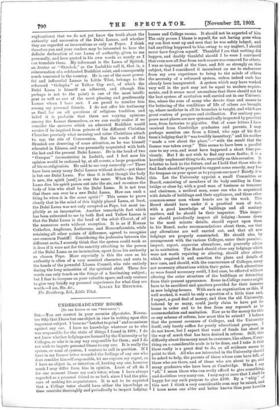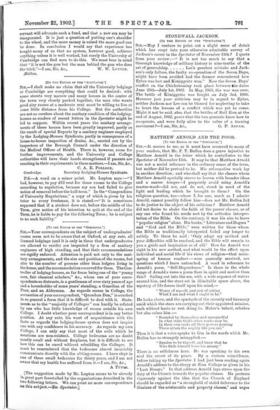UNDERGRADUATES' ROOMS.
[To THE EDIT012 OF THE "SPECTATOR...I
SIR,—You are correct in your surmise (Spectator, Novem- ber 8th) that I have but one object in view in writing upon this important subject. I have no " hatchet to grind " and no animus against any one. I have no knowledge whatever as to who was responsible for the state of things I found in 1894 ; I do not know whether lodgings are licensed by the University or by Colleges, or who is in any way responsible for them ; and I do not wish to impute personal blame to any one. It is really the system, or want of system, I venture to call in question. If I have in my former letter wounded the 'feelings of any one who does consider himself responsible, let me express my regret, as I have no object in, or intention of, hurting any one, however much I may differ from him in opinion. Least of all do I for one moment blame my son's tutor, whom I have always regarded as a personal friend to us both since I had the plea- sure of making his acquaintance. It is not to be expected that a _College tutor should have either the knowledge or time requisite thoroughly and "periodically to inspect lodging- houses and College rooms. It should not be expected of him The only person I blame is myself, for not having gone when my son first went up and seen that he was safely lodged; and had anything happened to him owing to my neglect, I should never have forgiven myself. Thankful I am that nothing did happen, and doubly thankful should I be were I convinced that even now all fear from such causes was removed for others. I was so impressed at the time, and felt so strongly on this subject, that I considered it incumbent on me to endeavour from my own experience to bring to the minds of others the necessity of a reformed system, unless indeed such has already been inaugurated. A system which may have worked very well in the past may not be equal to modern require. ments, and it seems most anomalous that there should not be the best system of sanitation well carried out in our Universi- ties, where the sons of many who devote time and means to the bettering of the conditions of life of others are brought up, where medicine in all its branches is taught, and which are great centres of progress and civilisation. For sanitary pur. poses most places are now systematically inspected by practical men, from factories to pig-sties. Out of some letters I have received from Cambridge graduates and parents, I may perhaps mention one from a friend, who says of his first term's lodging that it " was terribly insanitary," and his mother " made a row about the place,"—" with the result that the license was taken away." This seems to have been a parallel case to my own, and must have happened a short time pre- viously. But I do not wish to find any more faults; it is a horridly unpleasant thing to do, especially on this occasion. It is better to look to the future, and as I hold that those who do find fault should be prepared to suggest some remedy, may I so far trespass on your space as to propose one now P Briefly, it is this. Let the University appoint a small Committee or Board, consisting of members of its body residing in Cam- bridge or close by, with a good man of business as treasurer and chairman, a medical man, some one who is acquainted with details of buildings and their appliances, and three other common-sense men whose hearts are in the work. This Board should have under it a practical man of tact, with a good knowledge of buildings and all sanitary matters, and he should be their inspector. This inspec- tor should periodically inspect all lodging - houses down to the most minute details, should report upon them to his Board, make recommendations about them, see that any alterations are well carried out, and that all new lodgings are properly constructed. He should also, by arrangement with the various Colleges, enter their premises. inspect, report, supervise alterations, and generally advise as to sanitation. The Board should close any lodgings which were not worth repairing or altering, should alter others which required it and sanction the plans and details of new ones, and should, with the concurrence of Colleges, carry out necessary alterations within their gates. Such alterations as were found necessary could, I feel sure, be effected without altering the outer structure of the buildings or detracting from their present appearance. Some in-College rooms might have to be sacrificed and quarters provided for their inmates in new lodging-houses. With such an organisation as this, if well worked, it would be only a question of a little time and, I expect, a good deal of money, and then the old University, beloved by so many, could justly claim to have put its house in order and to be free from any reproach as to accommodation and sanitation. Now as to the money for this or any scheme of reform, how must this be raised ? I believe that the present revenues of Colleges, and the University itself, only barely suffice for purely educational purposes. do not know, but I expect that want of funds has stood in the way of much that has been desired in reform. Still, this difficulty about the money must be overcome, like others, if any- thing on a considerable scale is to be done, and I take it that there really is a great deal to do, as all evidence seems to point to that. All who are interested in the University should be asked to help, the parents of those whose sons have left, of those who are there, and of those who are about to go, and many graduates who have been at Cambridge. When I say "all," I mean those who can really afford to give something, and doubtless very many can. I may say at once that I shall be happy for any such purpose to give £100. By a " whip of this sort I think a very considerable sum may be raised, and I hope some one abler and better known than your humble
servant will advocate such a fund, and that a new era may be inaugurated. It is just a question of putting one's shoulder to the wheel, and the more money is raised the more good can be done. In conclusion I would say that experience has taught many of us that no system, however good, achieves anything unless it is well worked, but surely the University of Cambridge can find men to do this. We must bear in mind that "it is not the gun but the man behind the gun who does











































 Previous page
Previous page